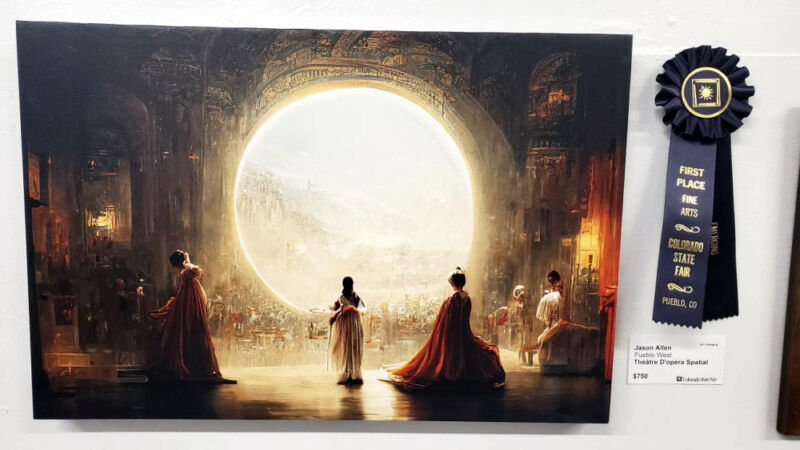
reader comments
250 with
On Tuesday, the US Copyright Office Review Board rejected copyright protection for an AI-generated artwork that won a Colorado State Fair art contest last year because it lacks human authorship required for registration, Reuters reports. The win, which was widely covered in the press at the time, ignited controversy over the ethics of AI-generated artwork.
“The Board finds that the Work contains more than a de minimis amount of content generated by artificial intelligence (“AI”), and this content must therefore be disclaimed in an application for registration. Because Mr. Allen is unwilling to disclaim the AI-generated material, the Work cannot be registered as submitted,” the office wrote in its decision.
In this case, “disclaim” refers to the act of formally renouncing or giving up any claim to the ownership or authorship of the AI-generated content in the work. The office is saying that because the work contains a non-negligible (“more than a de minimis”) amount of content generated by AI, Allen must formally acknowledge that the AI-generated content is not his own creation when applying for registration. As established by Copyright Office precedent and judicial review, US copyright registration for a work requires human authorship.
A history of denials
In August 2022, Artist Jason M. Allen created the piece in question, titled Theatre D’opera Spatial, using the Midjourney image synthesis service, which was relatively new at the time. The image depicting a futuristic royal scene won top prize in the fair’s “Digital Arts/Digitally Manipulated Photography” category.
revoked copyright protection for images made by artist Kris Kashtanova using Midjourney for the graphic novel Zarya of the Dawn but allowed copyrighting the human-arranged portions of the work. More recently, it also denied copyright registration for an image that computer scientist Stephen Thaler claimed was autonomously generated by his AI system.
Reuters quoted Allen as saying that the office’s decision was expected, but he is certain he will win in the end. “If this stands, it is going to create more problems than it solves,” Allen told the news service. “This is going to create new and creative problems for the copyright office in ways we can’t even speculate yet.”





